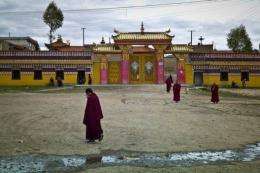China steps up Internet controls in Tibet

China's top leader in Tibet has ordered increased controls over the Internet and mobile phones, state press said Thursday, ahead of upcoming sensitive anniversaries in the restive region.
Chen Quanguo, Communist Party head of Tibet, said maintaining stability in the Himalayan region was of utmost importance during the meeting of China's National People's Congress which opens its annual session on Monday, the Tibet Daily said.
"Mobile phones, Internet and other measures for the management of new media need to be fully implemented," the paper quoted Chen as telling a Thursday meeting.
"We must further spread throughout the region the the main idea that stability means everything. Unstable elements must be nipped in the bud and all work at maintaining stability must be deepened."
The controls on new media appeared to be aimed at stopping information of unrest and crackdowns in one area from spreading and inciting other areas.

Chen's comments follow a series of measures implemented by the government following a recent spate of self-immolations and violent protests against Chinese rule in the nation's Tibetan-inhabited areas.
At least 22 self-immolation attempts have occurred in China over the last year, with many being undertaken by Tibetan Buddhist monks or former monks, rights groups say.
Police have also opened fire on Tibetan protesters in recent weeks.
In his speech, Chen said security forces must "crush hostile forces" led by the Dalai Lama who are plotting to bring instability to Tibet and destroy the atmosphere for the congressional meeting.
Beijing has blamed the Dalai Lama, Tibet's exiled spiritual leader who fled to India in March 1959, for recent unrest in Tibet and nearby areas.
In March 2008, several months ahead of the Beijing Olympics, riots in Lhasa and other Tibetan-inhabited areas erupted, resulting in a huge security presence that largely remains in place today, rights groups say.
Tibetans have long chafed at China's rule over the vast Tibetan plateau, accusing Beijing of curbing religious freedoms and eroding their culture and language.
Beijing insists that Tibetans enjoy religious freedom and have benefited from improved living standards brought on by China's economic expansion.
(c) 2012 AFP


















